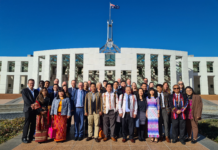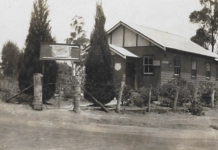
When first coming to Jesus at conversion I clearly understood that I was coming into a relationship with God through grace and by faith. I did not appreciate then that I had also crossed over into a new community, into a deep relationship with other people of God. Within weeks I was moving from a profound sense of loneliness to a new understanding of the gifts that other people were to me.
There was the chemist who pushed scripture union notes across the pharmacy counter one Friday saying, “read the Bible John and read it regularly”. There was a Sunday school teacher named Margaret who systematically introduced me to group Bible study in the interaction of the class. There were the new friends I met at the youth group. My new community included slightly older men who taught me scripture both in bible interpretation and application to life and a pastor who nurtured my early interest in ministry. There was another pastor who sponsored my serious entry into the pulpit ministry and later, into the committee for ministry for which he thoroughly prepared me for study in Morling college. Theological college was a place of further formative community. Within six months of entering College I became a solo student pastor in a suburban congregation where people tolerated, encouraged, stretched and entertained me in their homes and took me into their hearts. Some people even hurt me. Christian community was in operation and I was being formed as both a Christian and a pastor within the world of relationships, with God and with God’s people.
That this should occur for me was not extraordinary, nor out of keeping with the directives and descriptions of Christian community in the scriptures. In a formative definition of humility in Romans 12: 3 the apostle Paul declares that humility involves not having a higher estimate of ourselves than we ought, but to seriously work at having a realistic estimate of ourselves in the sight of God and other people, especially the discerning people who know us best. This means that we are to have an informed understanding of personal strengths, weaknesses, limitations and ambitions. There is no place for overconfidence and ‘cockiness‘ in genuine self-assessment. Discerning family members, friends and colleagues who honestly share their opinions of our skills, strengths, vulnerabilities and failures with us demonstrate great care. Our understanding of who and what we are is constantly nurtured as we continue to be students of scripture, whether read, reflected on and integrated into life and practice.
Humility in relationships is an essential component of healthy Christian relationships and community. Humility in relationship with others means that we are free from competitiveness that seeks to dominate others. A healthy attitude to self and others means that I am open to going the second kilometre with others who ask for help. Relationships that reflect Jesus’ relationship with his closest colleagues are sacrificial, rather than selfishly assertive.
Love of other people always involves a level of respect. An open attitude to others chooses not to be defensive and possessive. Being hospitable towards others must be coupled with discernment rather than naiveté. We need to discriminate against that which is evil, abusive and motivated by hated, or a desire to diminish other people, or cloud the truth of God. We need to discern who the ‘people of the lie’ are and not align myself with them or their behaviours.
Christian relationships are characterised by a desire to demonstrate genuine Christ shaped love. I respond to those who curse me or discriminate against me unjustly with compassion. I am to strive to live peacefully with others, rather than choosing to be angst ridden. The disciplines of Christian love require me to be discerning about the wrongs others do to me. I need to be able to name the wrong, at the very least to myself, and maybe to the offender and then to work towards forgiveness and reconciliation. Where wrongdoing is destructive to the community of faith, then discipline must be exercised, always remembering that discipline in whatever form is about reconciliation rather than punishment. Revenge has no part in Christian relationships.
Openness to others means that I remain teachable while retaining a clear sense of who I am and the values that I embrace. I recognise the people with the gift of teaching and leadership; learning from them and following them when I need to. Likewise, I am to affirm and receive the gifts that others demonstrate. I am to reject independent pride that refuses to graciously receive what others endeavour to share with me. I am to maintain a generous posture towards the marginalised and those in need around me. To practice compassionate attitudes towards others is to embrace people in my world of relationship who are different to me professionally, socially and culturally.
To digress for a moment: I recall an early pastorate in the seventies, living and serving in a deeply socially divided community. The community included some of Australia’s elite, who mingled with members of the royal family; competent and well educated professionals; both ‘blow throughs’ or temporary residents; and long term locals; rural workers and marginalised people in both the Caucasian and the Black community. As a pastor, I found that rather than being irrelevant and obscure members of the community, along with other pastors in town, had access to all levels of the community. In the small and relatively new Baptist church we had people from all levels of society coming to the services. Working within that community of faith I came to realisation that a focus on Jesus as Lord and liberator of his people was transformative for all participants.
Within that community was a black elder of the local AIM congregation and of his own divided people. His love for Jesus drove this retired railway worker to serve the wider community with grace, respect and humility that transcended human division and bitterness. He was a living example of Jesus the transformer in our midst. He is one of the people who I have known that have been among God’s gifts to me and so many others.
Empathy with others who suffer hardships and deprivation is to be a distinctive within Christian relationships. Learning how to be patient with others in their suffering and vulnerability takes time and practice. Empathy militates against pride that prevents me from receiving the support and care when others offer support, even when that care is poorly expressed or inadvertently misdirected.
I am conscious even as I write words like ‘openness, hospitality, teachability’ I am being quite counter cultural in contemporary society where assertiveness and getting what I deserve is promoted in all kinds of ways. Nevertheless, the more open and humble attitudes that I speak of are those honoured by Jesus in the sermon on the mount. They are upheld in the directive in the book of James (James 1:9-11) and in other scriptures. They are the outcome of ‘making every effort’ to practice goodness, self control, endurance, mutual affection and godliness to ‘keep from ineffectiveness and unfruitfulness in relationships and life (2 Peter 1:5ff). All of the characteristics named here are demanding and have relational implications.
As I write, I am led to reflect on a recent experience. Janice, my wife and I recently travelled through Israel with 29 other people, most of whom are members of our church here at Kellyville/Rouse Hill in Sydney’s northwest. After two weeks, we went off to have a second tour in Turkey, traveling in a largely Australian tour group. In both cases we travelled by coach and there were just a handful of Christians in the second coach. Both experiences of relationship were pleasant and without difficulty but I ask myself what, if anything made the all-christian group distinctive?
I think the answer to this question is ‘yes’. In the Christian group we held a common loyalty to Christ that formed a framework for our coping with each other’s idiosyncrasies, there was an embracing of difference, there were past experiences of forgiveness shared, there was a mutual desire to serve and to look out for each other and to sacrifice when the situation called for it. Importantly, there was among us a deep sense of the presence of the living God, who by the Holy Spirit travelled with us through this extraordinary location. We found glimpses of a similar connectedness with the Christians who opened up to us among our Turkey touring colleagues.
This written reflection leads me to conclude that a precious and beautiful thing that God brings to us at conversion is other people who partner with us in community focused on God, the Father, Son and Holy Spirit. The gift is to be taken from the hands of God, treasured and cultivated persistently. We were never meant to walk with Jesus on our own!



































